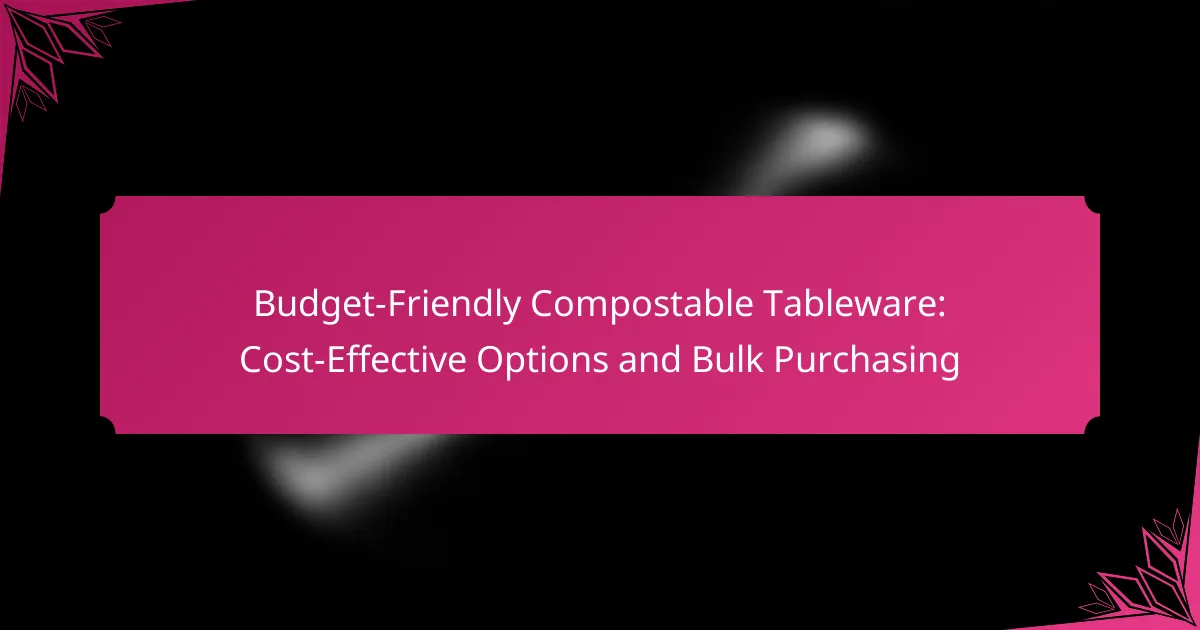Budget-friendly compostable tableware offers a sustainable solution for those looking to reduce waste without sacrificing quality or style. By purchasing these eco-friendly products in bulk, consumers can enjoy significant savings while ensuring they have ample supplies for events or daily use. Understanding the cost differences between compostable and traditional options empowers buyers to make informed choices that benefit both their budget and the environment.
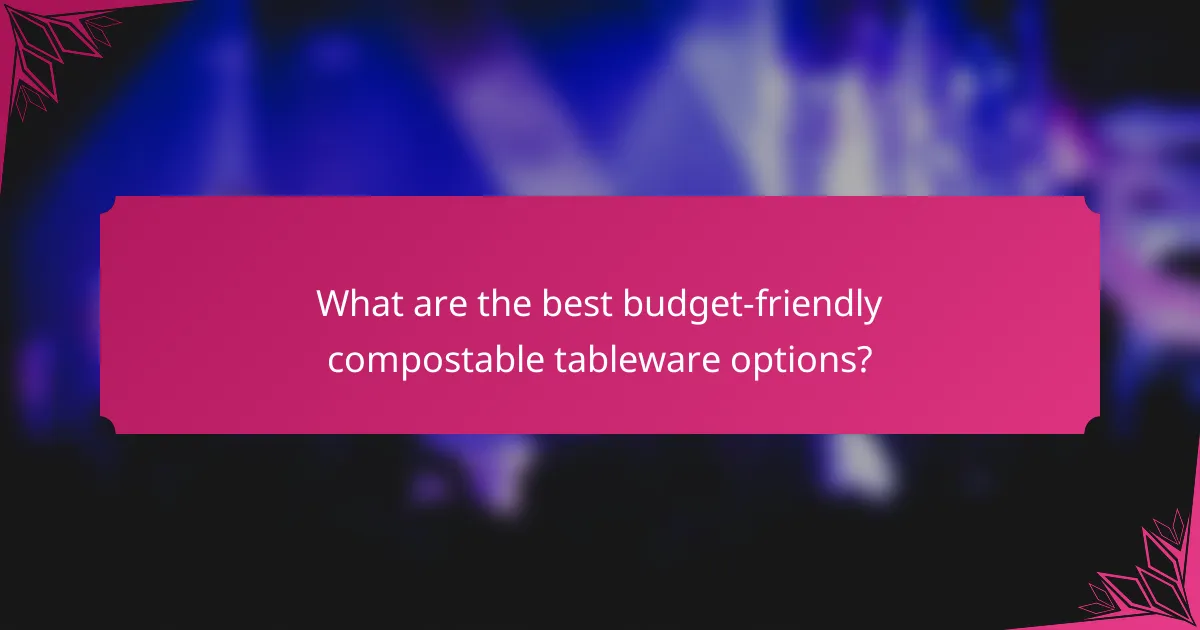
What are the best budget-friendly compostable tableware options?
Budget-friendly compostable tableware options include a variety of materials that are both cost-effective and environmentally friendly. These options allow consumers to reduce waste while maintaining functionality and style during events or daily use.
Eco-Products Sugarcane Plates
Eco-Products sugarcane plates are made from the byproducts of sugarcane processing, making them a sustainable choice. They are sturdy, microwave-safe, and can hold both hot and cold foods, making them versatile for various occasions.
These plates are typically available in bulk, which can significantly lower the cost per unit. Expect to pay around $30 to $50 for a pack of 100 plates, depending on the size and supplier.
Biodegradable Paper Bowls
Biodegradable paper bowls are an excellent option for serving soups and salads. Made from recycled paper and lined with a biodegradable coating, they provide a leak-resistant solution without harming the environment.
Prices for biodegradable paper bowls generally range from $20 to $40 for a bulk pack of 100. Look for options that are certified compostable to ensure they meet environmental standards.
Compostable PLA Cutlery
Compostable PLA cutlery is crafted from polylactic acid, a plant-based plastic derived from corn starch. This type of cutlery is suitable for both hot and cold foods and is typically compostable in commercial facilities.
When purchasing in bulk, expect to pay around $25 to $45 for a set of 100 forks, knives, and spoons. Always check for certifications to ensure the cutlery meets compostability standards.
Bagasse Food Containers
Bagasse food containers are made from the fibrous residue left after sugarcane juice extraction. These containers are durable, grease-resistant, and suitable for both hot and cold items.
Bulk pricing for bagasse containers usually falls between $30 and $60 for a pack of 50 to 100, making them an economical choice for catering or takeout services.
Areca Leaf Plates
Areca leaf plates are crafted from fallen leaves of the Areca palm, offering a natural and elegant tableware option. They are sturdy, biodegradable, and can be used for both hot and cold dishes.
These plates can be found in bulk for about $40 to $70 for a pack of 100. Their unique appearance makes them popular for special events and eco-conscious gatherings.

How can I purchase compostable tableware in bulk?
Purchasing compostable tableware in bulk can significantly reduce costs and ensure you have enough supplies for events or business needs. Look for suppliers that specialize in eco-friendly products to maximize both savings and sustainability.
Wholesale Suppliers for Eco-Friendly Products
Wholesale suppliers often offer the best prices for compostable tableware, as they sell in larger quantities. Companies like Eco-Products and Biopak provide a range of options, from plates to cutlery, at competitive rates. When selecting a wholesale supplier, consider their minimum order quantities and shipping costs.
Many wholesale suppliers also provide samples, allowing you to assess product quality before committing to a larger order. This can help avoid potential issues with durability or usability during your events.
Online Retailers with Bulk Discounts
Online retailers frequently offer bulk discounts on compostable tableware, making it easy to compare prices and products. Websites such as Amazon Business and Green Paper Products often have dedicated sections for bulk purchases, allowing for straightforward ordering.
Check for subscription options or loyalty programs that can provide additional savings over time. Be sure to read customer reviews to gauge the quality and reliability of the products before purchasing.
Local Suppliers for Sustainable Tableware
Local suppliers can be a convenient option for purchasing compostable tableware, especially if you need items quickly. Many cities have eco-friendly stores or distributors that focus on sustainable products. Supporting local businesses can also reduce shipping costs and environmental impact.
Visit local farmers’ markets or green expos to find suppliers who specialize in compostable products. Engaging with local vendors can also lead to personalized service and potential discounts for bulk orders.
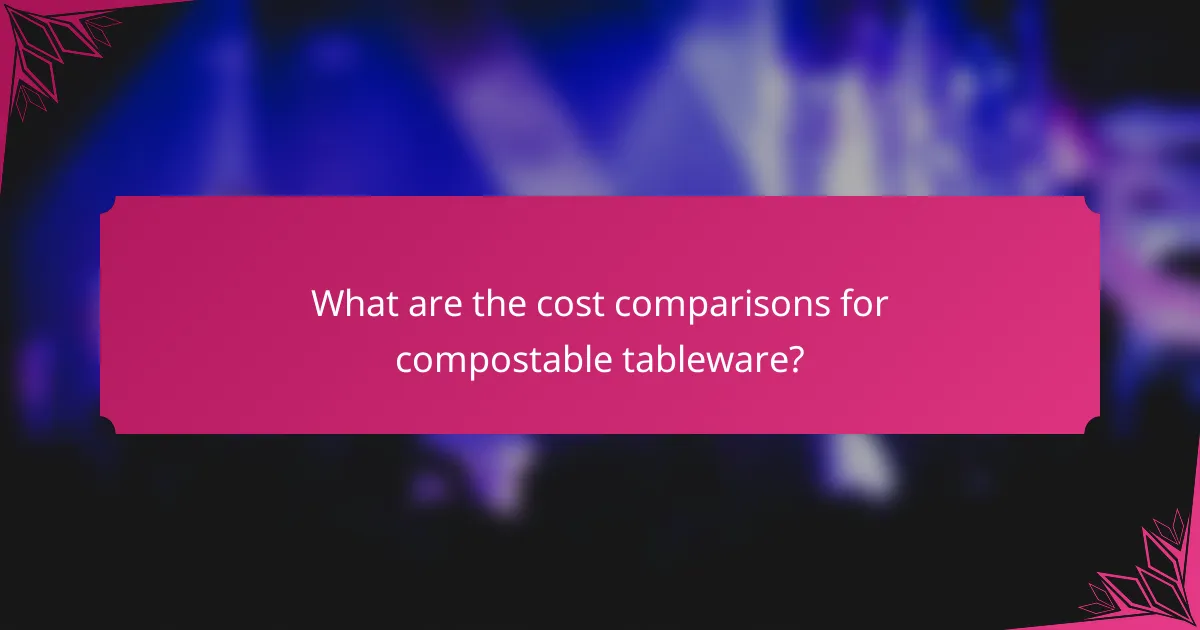
What are the cost comparisons for compostable tableware?
Compostable tableware generally costs more than traditional options, but the price difference can vary significantly based on the type of product and purchasing method. Understanding these cost comparisons helps consumers make informed decisions when choosing eco-friendly alternatives.
Price Comparison of Eco-Products vs. Traditional Tableware
Eco-friendly tableware, such as compostable plates and utensils, typically ranges from 20% to 50% higher in price compared to conventional plastic or paper products. For instance, a pack of 50 compostable plates may cost around $15 to $25, while traditional plates could be found for $10 to $15. This price gap is influenced by the materials used and the production processes involved in creating sustainable products.
Additionally, the environmental benefits of compostable tableware can offset the higher initial costs. By reducing landfill waste and promoting a circular economy, these products contribute to long-term savings in waste management and environmental restoration efforts.
Bulk Pricing vs. Retail Pricing
Purchasing compostable tableware in bulk can significantly lower the per-unit cost. Retail prices for smaller quantities often range from $0.30 to $0.50 per item, while bulk purchases can reduce this to $0.15 to $0.30 each. Many suppliers offer discounts for larger orders, making it a cost-effective option for events or businesses.
When considering bulk purchases, it’s essential to evaluate storage capabilities and shelf life. Ensure that the products can be stored without compromising their quality, as some compostable items may have a shorter shelf life compared to traditional tableware.
Cost-Effectiveness of Compostable Options
While the upfront costs of compostable tableware can be higher, their cost-effectiveness becomes apparent when considering disposal expenses and environmental impact. Many municipalities are now charging fees for waste disposal, making compostable options a financially savvy choice in the long run.
Furthermore, businesses that use compostable tableware may attract environmentally conscious customers, potentially increasing sales. Offering sustainable options can enhance brand loyalty and differentiate a business in a competitive market.
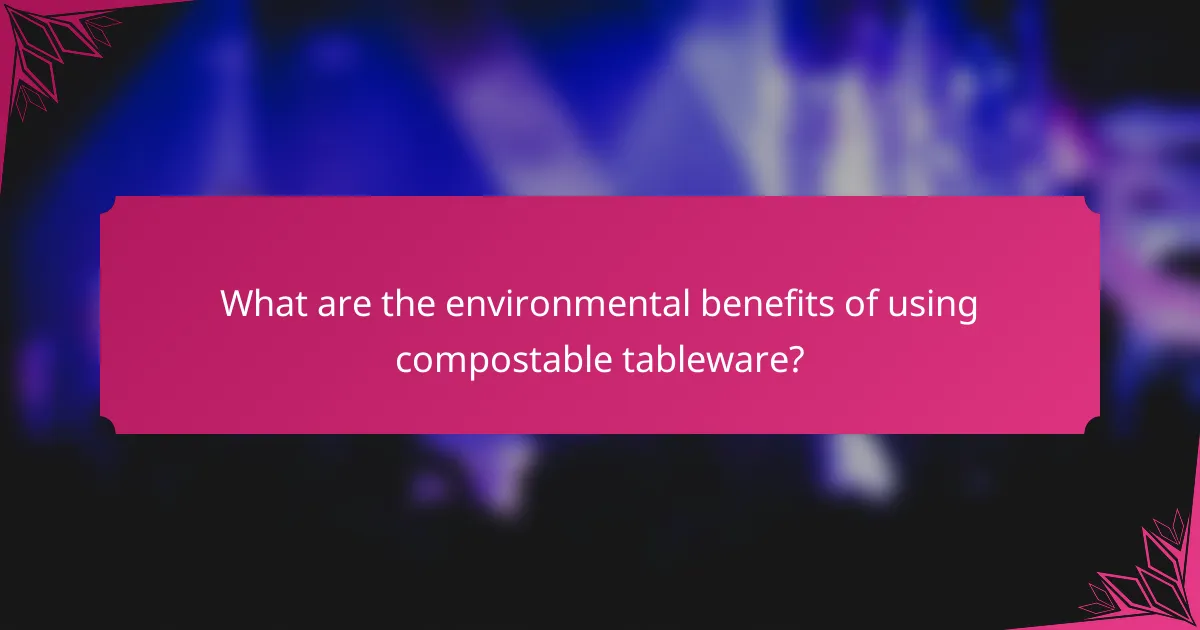
What are the environmental benefits of using compostable tableware?
Compostable tableware offers significant environmental advantages by reducing waste and promoting sustainable practices. These products break down naturally, minimizing pollution and supporting soil health.
Reduction of Plastic Waste
Using compostable tableware directly contributes to the reduction of plastic waste, which is a major environmental concern. Traditional plastic items can take hundreds of years to decompose, while compostable alternatives can break down in a matter of months under the right conditions.
By choosing compostable options, individuals and businesses can significantly lower their plastic footprint. This shift not only helps the environment but also encourages others to adopt eco-friendly practices.
Biodegradability and Composting Process
Compostable tableware is designed to biodegrade in composting environments, where microorganisms break down organic materials. This process typically occurs within 90 to 180 days, depending on the conditions such as temperature and moisture levels.
To ensure effective composting, it’s essential to dispose of these items in designated compost bins rather than regular trash. This helps facilitate the breakdown process and contributes to nutrient-rich compost that can be used in gardening and agriculture.
Impact on Landfill Reduction
Compostable tableware plays a crucial role in reducing landfill waste. When compostable items are sent to landfills, they can generate methane, a potent greenhouse gas, if they decompose anaerobically. In contrast, composting allows for aerobic decomposition, which is less harmful to the environment.
By using compostable products, communities can decrease the volume of waste sent to landfills, promoting a more sustainable waste management system. This shift not only benefits the environment but can also lead to cost savings for municipalities in waste disposal.
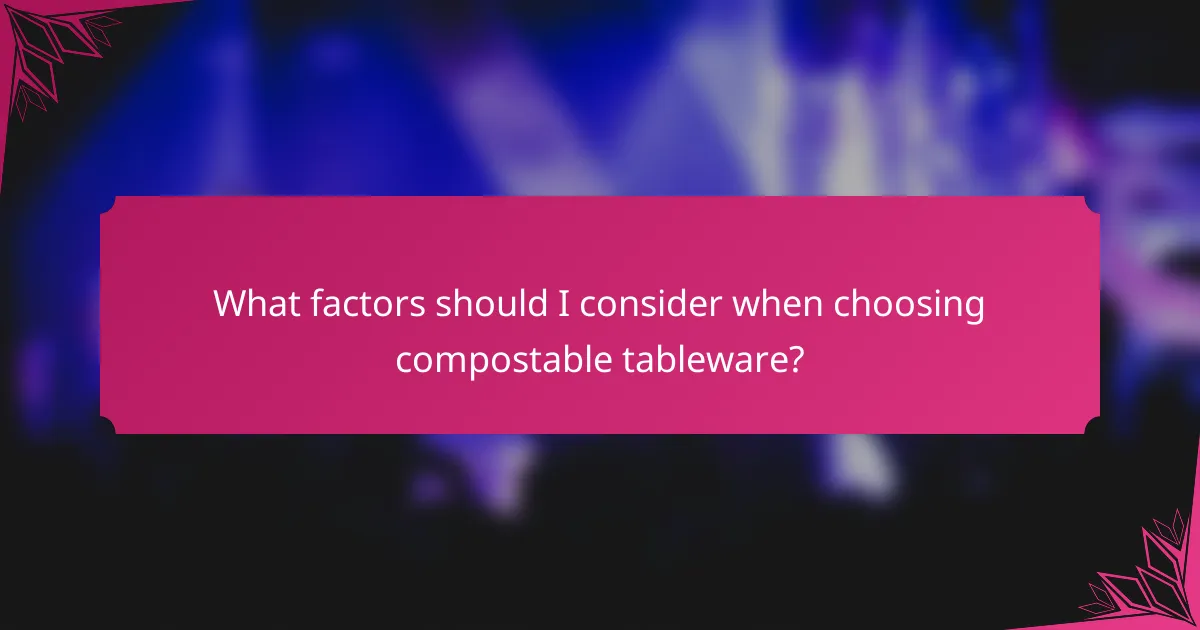
What factors should I consider when choosing compostable tableware?
When selecting compostable tableware, consider material types, compatibility with various food items, and certification standards. These factors will help ensure that the tableware meets your needs while being environmentally friendly.
Material Types and Their Properties
Compostable tableware is typically made from materials such as PLA (polylactic acid), bagasse, and bamboo. PLA is derived from corn starch and is suitable for cold foods, while bagasse, made from sugarcane, is more robust and can handle hot items. Bamboo is durable and biodegradable, making it a popular choice for disposable plates and utensils.
Each material has its own properties that affect performance. For instance, PLA can become soft when exposed to high temperatures, while bagasse can withstand higher heat. Understanding these properties will help you choose the right type for your specific use case.
Compatibility with Food Types
It’s crucial to match compostable tableware with the types of food you plan to serve. For example, PLA is best for cold or room-temperature foods, while bagasse and bamboo are better suited for hot or oily items. Using the wrong material can lead to leaks or structural failure during service.
Consider the food’s acidity and moisture content as well. Highly acidic foods may degrade certain materials faster, while moist foods can compromise the integrity of weaker options. Always check the manufacturer’s recommendations for compatibility.
Certification and Standards for Compostability
Look for certifications that indicate the compostability of tableware, such as ASTM D6400 or EN 13432. These standards ensure that the products will break down in commercial composting facilities within a specific timeframe. Products that meet these certifications are more likely to be genuinely compostable.
Be cautious of products that claim to be compostable without proper certification, as they may not meet the necessary environmental standards. Always verify the claims made by manufacturers to ensure that your choices align with sustainable practices.

How does shipping and returns work for bulk orders?
Shipping and returns for bulk orders of compostable tableware typically involve specific policies that vary by supplier. Most companies offer standard shipping options and may have return policies that allow for exchanges or refunds under certain conditions.
Shipping options for bulk orders
When ordering compostable tableware in bulk, suppliers usually provide various shipping options, including standard, expedited, and freight shipping for larger quantities. Standard shipping is often the most cost-effective, while expedited options can significantly increase delivery speed but at a higher cost. It’s essential to check the estimated delivery times, which can range from a few days to a couple of weeks, depending on the supplier and your location.
Return policies for bulk orders
Return policies for bulk orders of compostable tableware can differ widely among suppliers. Many companies allow returns within a specific timeframe, often ranging from 30 to 90 days, provided the items are unopened and in their original packaging. Always review the return policy before placing an order to avoid unexpected costs or complications.
Considerations for shipping and returns
When planning a bulk order, consider the total shipping costs, which may include handling fees and taxes, especially for international shipments. Additionally, be aware of the supplier’s return conditions, as some may charge restocking fees or not accept returns on custom orders. To minimize risks, order samples before committing to larger quantities, ensuring the products meet your expectations.
